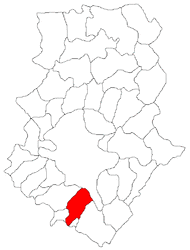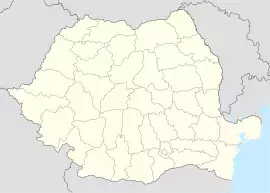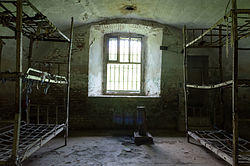Jilava | |
|---|---|
 Map of Ilfov county with Jilava commune highlighted | |
| Coordinates: 44°19′58″N 26°04′41″E / 44.33278°N 26.07806°E | |
| Country | |
| County | Ilfov |
| Population (2011)[1] | 12,223 |
| Time zone | EET/EEST (UTC+2/+3) |
| Vehicle reg. | IF |
| Website | www |
Jilava is a commune in Ilfov county, Muntenia, Romania, near Bucharest. It is composed of a single village, Jilava.
The name derives from a Romanian word of Slavic origin (Bulgarian жилав žilav (tough), which passed into Romanian as jilav) meaning "humid place".
In this commune there is an operating prison and also the Fort 13 Jilava.
Fort 13 Jilava
Jilava was the location of a fort built by King Carol I of Romania, as part of the capital's defense system. At a later date, the fort was converted into a prison. It is now a historical monument.
This prison is the site where, on November 26–27, 1940, the Iron Guard authorities of the National Legionary State killed 64 political prisoners as revenge for the previous killing of their leader Corneliu Zelea Codreanu (see Jilava Massacre); it was also here that Ion Antonescu, dictator (Conducător) of Romania during World War II, was executed for war crimes in 1946 and where on 23 October 1971 the serial killer, Ion Rîmaru was executed by firing squad.
The prison also was a detention site for political prisoners after the start of Communist rule in Romania.[2] According to a study done by the International Centre for Studies into Communism, 36.1% of all such prisoners did some time at Jilava Prison.[3] Among the political prisoners detained at Jilava were Corneliu Coposu, Richard Wurmbrand, Gen. Radu Korne, Gen. Nicolae Ciupercă, and Gen. Radu R. Rosetti,[4] as well as Gheorghe Arsenescu, Gen. Radu Băldescu, Aristide Blank, Victor Cădere, Gen. Dumitru Carlaonț, Gen. Dumitru Coroamă, Gen. Nicolae Dăscălescu, Gen. Ioan Dumitrache, Anton Durcovici, Radu Filipescu, Paul Goma, Iuliu Hossu, Ion Ioanid, George Ivașcu, Adm. Horia Macellariu, Mihail Manoilescu, Gen. Gheorghe Manoliu, Gen. Ion Negoițescu, Constantin Noica, Ovidiu Papadima, Lucrețiu Pătrășcanu, Gherman Pântea, I. Peltz, Nicolae Penescu, Constantin Titel Petrescu, Gen. David Popescu, Mihai Rădulescu, Alexander Ratiu, Nicolae Steinhardt, Alexandru Todea, Sandu Tudor, Alexandru Zub, and many others.
See also
- ro:Penitenciarul cu regim de maximă siguranță București, article in Romanian Wiki about the prison
References
- ^ "Populaţia stabilă pe judeţe, municipii, oraşe şi localităti componenete la RPL_2011" (in Romanian). National Institute of Statistics. Retrieved 4 February 2014.
- ^ Lăcătușu, Dumitru. "Scurt istoric al Fortului 13 Jilava". anp.gov.ro (in Romanian). Administrația Națională a Penitenciarelor. Retrieved January 14, 2021.
- ^ "Recensământul populației concentraționare din România în anii 1945 – 1989 (date preliminare)" (in Romanian). Retrieved April 18, 2020.
- ^ Ivanov, Catiușa (January 16, 2014). "Comoara necunoscută a Bucureștiului: forturile de apărare de pe vremea Regelui Carol I. În ce stare au ajuns și cum ar putea să intre in circuitul turistic". www.hotnews.ro (in Romanian). Retrieved January 10, 2021.
External links
![]() Media related to Jilava, Ilfov at Wikimedia Commons
Media related to Jilava, Ilfov at Wikimedia Commons

